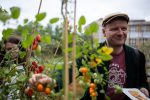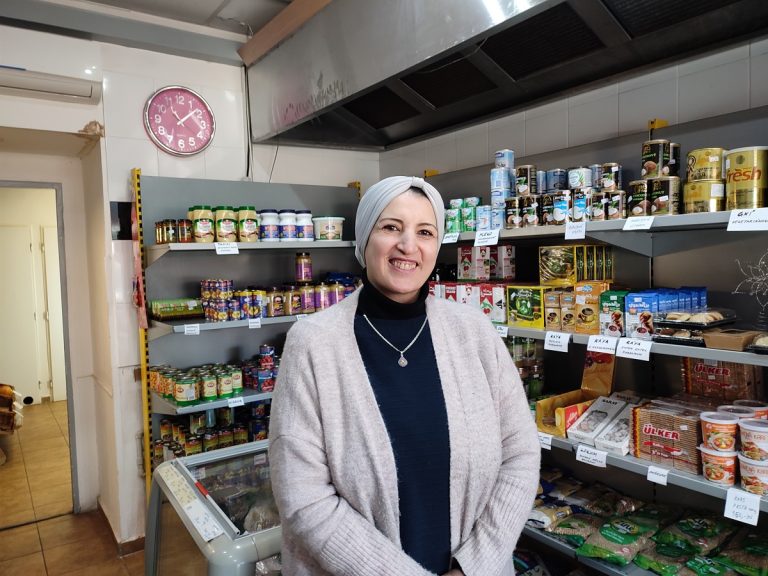Melis Karabulut’s series profiles some of Brno’s foreign entrepreneurs to explore the challenges of running a business in a foreign country. This week, she shares the inspiring story of Ms. Suliman, owner of the Syrian Family Mini Market on Lidická. Photo credit: MK / BD.
Being an entrepreneur is truly an amazing experience in life. I have seen how rewarding it is to your soul and journey from having interviewed just a few entrepreneurs in Brno, and some in other countries throughout my journalistic projects. Listening to the success stories of other entrepreneurs sparks inspiration in people to start their own businesses someday, giving them motivation and positive energy. As well as that, listening to the true resilience stories of the entrepreneurs who come from hardship and great challenges restores your belief in the strength of humankind, and explicitly shows you that lives can change, for good and for better.
This week on the Expat Entrepreneurs series, I am glad to share the story of the Family Minimarket and its owner Safa Suliman, a 53-year-old entrepreneur from Damascus, Syria, with a big heart, genuine warmth, cheerful energy and a powerful stance.
The story of my interview with the Family Minimarket started with a simple Facebook post that quickly went viral. One of the customers of the market shared a sympathetic post on several Facebook groups to encourage people to shop at the market to support Ms. Suliman’s business, which was in a difficult situation back in December 2021. As Czechs and foreigners kept sharing the post, the market started to get more customers and publicity on social media and several media outlets. As soon as I found a translator to help communicate with Ms. Suliman, I went to the shop to learn more about the story behind it all. Having worked with the social entrepreneurship of Syrian women back in Istanbul, I knew even before the interview that I would hear the story of someone so resilient, a go-getter. Like the other Syrian women I have known, she did not surprise me from the first minute.
Ms. Suliman and her family’s life in Brno started in 2014. Her husband, who studied engineering in Brno and was working at a company here at the time, helped his family get a reunification visa, which allowed them to build a new life in Europe. Her youngest child was eleven years old when they moved to the Czech Republic, and is now completing his high school education, while his siblings are now university graduates moving forward in their careers.
Ms. Suliman told me that at the beginning of their relocation, they had a hard time moving here, as they had to leave their country behind and start from scratch, adapting to a completely different culture, language and society. She said her family went through almost two years of depression caused by the difficult adaptation to life in the Czech Republic, at times made harder due to some discrimination from the society. As they received support from a few other Arabic people in Brno, other immigrants and also from some EU-funded NGOs, they kept on learning the language, and got further involved in life in Brno.
Around four years ago, to get financial independence, one of the NGOs that she was in contact with helped Ms. Suliman get a job working in the kitchen at a Czech restaurant, as she enjoyed cooking and was good at it. This way, being among Czechs and having a work environment, she found it easier and easier to sustain her life in the city. She emphasised that the main enabler of her employment was the EU’s funding for the local NGOs working with migrants, as while she was getting her salary from the EU, the NGOs also got a share of the funding by helping her. She also mentioned that many Western European countries have taken a considerably higher number of migrants from Syria, and worked more on integrating them into society, while there were only a few migrants on the integration and language courses that she was taking here.
After a while of working in restaurants, she started to find it difficult to sustain the busy work in the kitchen as a woman of her age. Then, a year ago, she decided to open her own business with the help of her husband. This seemed like a good idea to the family since there were not many Middle Eastern shops in Brno, and they wanted to make available the products that are special to the region.
[Best_Wordpress_Gallery id=”415″ gal_title=”EE_1″]The Family Mini Market sells many Middle Eastern products that are not easily available in Brno. Credit: MK / BD.
From the very opening until today, Ms. Suliman wanted to keep her prices as low as possible, to enable people who cannot afford food to shop from her market as well, even though most of her products are imported by Middle Eastern importers in Austria. However, she still struggled to find customers. There were only a few Arabs and Czechs visiting her shop for a long time, and she was on the verge of closing down the market due to her debts with rent, bills, buying the products, and other expenses. Her biggest problem was being able to cover the costs of running the business, which left her with almost no income for some time.
In December, a Czech customer came into the shop, without telling Ms. Suliman that she was a journalist. She saw that Ms. Suliman was upset, and her business was not going as well as she hoped. To support her, the journalist spread the word on social media. The day after the social media posts went out, Ms. Suliman started seeing many more Czech customers in her store, buying dates, okras, olives, tahini, vegetables, and rose water for Christmas. Ms. Suliman was surprised by the huge empathy, acceptance and interest that the Czech customers showed her, and this made her very happy, and she was also able to cover some of her debts. Sadly, she mentioned that there is little awareness in the expat community in the city about her business, possibly because the store is so easy to not notice at first sight. Ms. Suliman added that even though she wanted to make her store visually more attractive, she did not have the financial means. With her Czech improving, “Krok za krokem, (Step by step)…” she said, “I will try my best to improve my business. But we sure would appreciate some government support for expat businesses, as our expenses such as rent and taxes are higher than Czech business owners. This would make my business safer and more sustainable.”
Ms. Suliman says that she is importing Mediterranean vegetables that not many stores have in Brno, as well as Middle Eastern products such as halal meat, pickles, cheese, beans, herbs, baklava, Turkish delight, coffee, and many other products for friendly prices. The cucumbers, pomegranates and eggplants take me back home to my country, as they are organic and much smaller, which according to Ms. Suliman was interesting for Czech customers.
[Best_Wordpress_Gallery id=”418″ gal_title=”EE_2″]Some of the Mediterranean vegetables on offer look a bit different to what Czech customers are used to. Credit: MK / BD.
When I asked about her personal observations about life and people in the Czech Republic as a foreigner, Ms. Suliman told me that she likes Czech people and finds them cooperative, and that the society’s level of acceptance and tolerance is gradually improving from the first couple of years she was living in the country. She said that she has a lot of Czech female friends who come to the store to share a cup of tea with her.
Although the customs and traditions are different, it appears that Ms. Suliman and her family have integrated better into life here with time and endurance. She also finds living in the Czech Republic convenient, especially the working systems of the country. “The appointments are always on time, there is higher respect for law and order, for human rights and for people’s time. There is easier and better access to electricity, water, and other human needs, and the public transportation system is much more efficient,” she said, at which point my valuable translator and I had an aha moment in our own silence, as she was listing things that Europeans usually take for granted, and which we as Middle Eastern expats have also started to take for granted in Europe, and haven’t thought about for a long time.
The Family Mini Market can be found at Lidická 43, right next to the Antoninska tram stop near Luzanky Park. The store is open from 10 am to 6 pm every day except for Sundays.
A special thanks to Ms. Suliman for welcoming us into her story, and for her honesty and warmth, and to Ms. Z.T. for her great cooperation and skillful translation from Arabic to English during the interview.
- The Giving-Back Series: Finding a Voice in Art and Community Through Motherhood

- The Giving-Back Series: Maintaining Energy and Joy in Expat Life

- The Giving-Back Series: Three Brno NGOs In Need of English-Speaking Volunteers

- Expat Entrepreneurs: Andalusian Chef Caters For The Czech Republic With Unmatched Mediterranean Recipes

- Expat Entrepreneurs: Lviv’s Young Painter Nadia Danylova Brings Watercolor To Life in Brno








